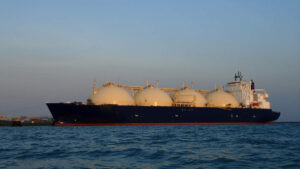Got Gas: Is emissions reduction the new game for LNG?

Pic: Vertigo3d / E+ via Getty Images
Got Gas is Stockhead’s fortnightly take on moves in Australia’s gas industry by our seasoned energy and resources journalist Bevis Yeo.
Australia’s liquefied natural gas sector appears to be back on track again with Santos (ASX:STO) signing a binding long-term LNG supply agreement with Japan’s Mitsubishi Corporation that includes an MoU to investigate emissions reduction.
After all, the deal is a key step towards the gas major making a final investment decision for its Barossa project north of Darwin.
But it’s their agreement to investigate opportunities to reduce emissions for carbon neutral LNG from Barossa that is especially interesting.
Santos has indicated that its final investment decision ready Moomba carbon capture and storage project is being considered to capture carbon emissions from Barossa while carbon credit agreements could also be used to offset emissions.
Clean hydrogen opportunities will also be investigated by the two companies.
This is what’s especially interesting about this development.
With the continued shift towards a lower or zero carbon economy, the LNG industry will likewise have to adapt given the increased scrutiny given to environmental, social and governance issues by shareholders and potential investors.
Some sign of this was seen earlier this year when 48.6 per cent of JP Morgan’s shares voted in support of a resolution that called on the largest bank in the US to outline how it intends to reduce greenhouse gas emissions associated with its lending activities.
While this was not sufficient to pass the resolution, the number of investors voting in its favour certainly sent a clear message to the bank.
Santos itself has also been on the receiving end of this move with nearly half of its shareholders backing resolutions at its annual general meeting in April to meet emissions targets and review membership in fossil fuel lobbies.
While these resolutions were not put to vote, Santos was forced to acknowledge shareholders’ concerns and at the beginning of this month, unveiled ambitious new emissions targets.
The company is now expecting to achieve net zero emissions by 2040, 10 years earlier than its previous goal of 2050, through a combination of large-scale carbon capture and storage, nature-based offsets, increased use of renewables and energy efficiency projects.
Gas emissions future
Santos’ move is likely to be a harbinger of similar attempts by other LNG companies to address ESG issues and achieve emissions targets.
And it wouldn’t have come a moment too soon.
While demand growth is expected to return as confidence in a COVID-19 recovery grows, the pandemic has had a lasting impact on expansion with commentors flagging that it is unlikely to grow at previous doubt digit rates.
LNG is also both a boon and threat to energy security as it frees up countries for reliance on their immediate neighbours for gas (European reliance on Russian gas being a key example), it also exposes them to risks from relying on an imported commodity.
Coupled with emissions concerns, it is all too easy for countries to accelerate the adoption of renewable energy.
Energy consultancy Wood Mackenzie has already handed the trophy to renewables, saying in May that over the next 20 years, the importance of thermal coal, gas and nuclear in the global power mix will fade gradually as renewables rise to prominence.
Got Gas won’t hazard a guess on how true this might be, but addressing the carbon emissions generated by the production of LNG and when it is consumed by the customer could keep the supercooled gas relevant for longer – especially replacing coal in the energy mix.
Achieving low or zero net emissions could also make new LNG projects or expansions more palatable for financiers who are increasingly reluctant to pull the trigger on multi-billion dollar investments that fail to tick all the right green boxes.
Looking further ahead, Australian energy companies could also take a page from supermajors such as BP and Shell and make substantial renewable energy investments that have minimal or no emissions to worry about.
Related Topics

UNLOCK INSIGHTS
Discover the untold stories of emerging ASX stocks.
Daily news and expert analysis, it's free to subscribe.
By proceeding, you confirm you understand that we handle personal information in accordance with our Privacy Policy.








